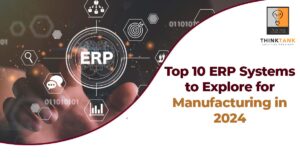Outline for “Top ERP Software Solutions
- H1: Top ERP Software Solutions
- Introduction to ERP and its importance for businesses
- H2: What is ERP Software?
- Definition of ERP (Enterprise Resource Planning)
- Key functionalities of ERP software
- H2: Why Do Businesses Need ERP Software?
- Integrating various business processes
- Centralized data management
- Enhancing decision-making capabilities
- H2: Key Features to Look for in ERP Software
- H3: Customization
- H3: Scalability
- H3: Integration with other systems
- H3: Real-time reporting
- H2: Top ERP Software Solutions in the Market
- H3: SAP S/4HANA
- Overview and features
- Pros and cons
- H3: Oracle ERP Cloud
- Overview and features
- Pros and cons
- H3: Microsoft Dynamics 365
- Overview and features
- Pros and cons
- H3: NetSuite ERP
- Overview and features
- Pros and cons
- H3: Odoo ERP
- Overview and features
- Pros and cons
- H3: Epicor ERP
- Overview and features
- Pros and cons
- H3: SAP S/4HANA
- H2: How to Choose the Best ERP Software for Your Business
- Business size and industry
- Budget considerations
- Customization needs
- Cloud vs. on-premise solutions
- H2: ERP Software Pricing Models
- Subscription-based vs. one-time payment
- Costs of implementation and support
- H2: Benefits of Using ERP Software
- H3: Improved efficiency
- H3: Better data management
- H3: Streamlined operations
- H2: Common Challenges of Implementing ERP Systems
- Complexity of installation
- Employee training and adoption
- Integration with existing systems
- H2: Tips for a Successful ERP Implementation
- Phased approach to implementation
- Continuous training and support
- Monitoring and optimizing performance
- H2: ERP Software Trends for 2024
- AI and machine learning integration
- Cloud-based ERP growth
- Industry-specific ERP solutions
- H2: Case Study: A Business Successfully Implementing ERP Software
- Example of a company that benefited from ERP implementation
- H2: Conclusion
- Summary of key points
- Final thoughts on choosing the best ERP solution
- H2: FAQs
- H3: What is the best ERP software for small businesses?
- H3: Can ERP software integrate with other tools?
- H3: What industries benefit the most from ERP solutions?
- H3: Is cloud-based ERP better than on-premise ERP?
- H3: How long does ERP implementation take?
Top ERP Software Solutions
Enterprise Resource Planning (ERP) software has become a critical tool for modern businesses looking to streamline operations, integrate different departments, and improve overall efficiency. Choosing the right ERP system can be overwhelming, but the right solution will help businesses automate processes and gain better insights into their performance. In this article, we’ll dive into the top ERP software solutions available, discuss their features, and guide you in selecting the best fit for your business.
What is ERP Software?
ERP software is an integrated suite of applications that manage core business processes, including finance, supply chain, human resources, and manufacturing. By using a centralized system, businesses can unify and automate tasks across departments, ensuring that data is consistent and accessible to the right people at the right time.
Key functionalities of ERP software include financial management, inventory control, customer relationship management (CRM), and procurement. With ERP, businesses can gain visibility into their operations and make data-driven decisions.
Why Do Businesses Need ERP Software?
ERP software allows businesses to integrate various functions—such as accounting, sales, and inventory management—into one unified system. Here are some key benefits:
- Integrating various business processes: ERP brings together different functions, from finance to human resources, into a single platform, reducing silos within the organization.
- Centralized data management: With ERP, all data is stored in one location, making it easier to access and share across departments.
- Enhancing decision-making capabilities: Real-time data insights provided by ERP software help management make informed decisions, improving overall business performance.
Key Features to Look for in ERP Software
When choosing ERP software, it’s essential to consider certain features to ensure it meets your business’s needs:
Customization
ERP software should be adaptable to the unique needs of your business. Look for solutions that offer customizable modules and workflows.
Scalability
As your business grows, your ERP system should be able to scale with you, supporting additional users, departments, and operations.
Integration with Other Systems
ERP should integrate seamlessly with your existing software, including accounting systems, CRMs, and e-commerce platforms.
Real-Time Reporting
Access to real-time data through dashboards and reports is crucial for making timely business decisions.
Top ERP Software Solutions in the Market
SAP S/4HANA
SAP S/4HANA is one of the most popular ERP solutions, particularly for large enterprises. It offers a wide range of modules, from finance to supply chain management, and is known for its real-time data processing capabilities.
- Pros: Powerful real-time data analytics, industry-specific modules, and high scalability.
- Cons: High cost, complex implementation.
Oracle ERP Cloud
Oracle ERP Cloud is a comprehensive cloud-based ERP solution that is ideal for businesses of all sizes. It offers powerful financial and operational capabilities, along with advanced analytics.
- Pros: Cloud-based, strong financial management, scalable.
- Cons: Can be expensive for smaller businesses, steep learning curve.
Microsoft Dynamics 365
Microsoft Dynamics 365 combines ERP and CRM functionalities in one platform, making it an excellent choice for businesses that need a highly integrated solution. It’s flexible, scalable, and works well for companies of all sizes.
- Pros: Seamless integration with other Microsoft products, flexible pricing, scalable.
- Cons: Some features may require additional licensing, complex setup.
NetSuite ERP
NetSuite ERP, part of Oracle’s portfolio, is a leading cloud-based solution designed for growing businesses. It provides comprehensive features for managing finance, inventory, customer relations, and e-commerce.
- Pros: Cloud-based, highly customizable, strong financial capabilities.
- Cons: High upfront costs, limited industry-specific features.
Odoo ERP
Odoo is an open-source ERP platform known for its flexibility and modular approach. It’s a cost-effective option for small and medium-sized businesses looking for customizable ERP solutions.
- Pros: Affordable, customizable, open-source.
- Cons: Requires technical expertise to implement, limited customer support.
Epicor ERP
Epicor ERP is designed for mid-sized businesses, particularly in the manufacturing and distribution sectors. It offers industry-specific features and is known for its strong production management capabilities.
- Pros: Industry-specific modules, strong support for manufacturing, flexible deployment options.
- Cons: Complex implementation, high cost for smaller businesses.
How to Choose the Best ERP Software for Your Business
Choosing the right ERP solution depends on several factors:
- Business size and industry: Consider whether the ERP solution fits your specific industry, whether it’s manufacturing, retail, or professional services.
- Budget considerations: ERP software can be a significant investment. Look for a solution that offers the right balance between cost and functionality.
- Customization needs: Depending on your operations, you may need an ERP system that can be tailored to your specific workflows.
- Cloud vs. on-premise solutions: Cloud ERP is increasingly popular due to its scalability and lower upfront costs, while on-premise ERP provides more control over data and security.
ERP Software Pricing Models
ERP solutions can vary in pricing depending on the features and deployment method:
- Subscription-based vs. one-time payment: Cloud-based ERPs typically follow a subscription model, while on-premise solutions may involve a one-time license fee.
- Costs of implementation and support: Implementing an ERP system can be costly, especially if customizations, training, and support are required. Be sure to factor in ongoing support costs as well.
Benefits of Using ERP Software
Improved Efficiency
ERP systems automate many manual tasks, leading to better efficiency across the organization.
Better Data Management
With centralized data, businesses can ensure consistency and accuracy across departments.
Streamlined Operations
By integrating various business processes, ERP systems streamline operations, resulting in faster and more efficient workflows.
Common Challenges of Implementing ERP Systems
Implementing ERP software can be a complex and time-consuming process, especially for larger organizations:
- Complexity of installation: Implementing ERP systems can require significant resources and time.
- Employee training and adoption: It’s crucial to ensure that employees are properly trained to use the

